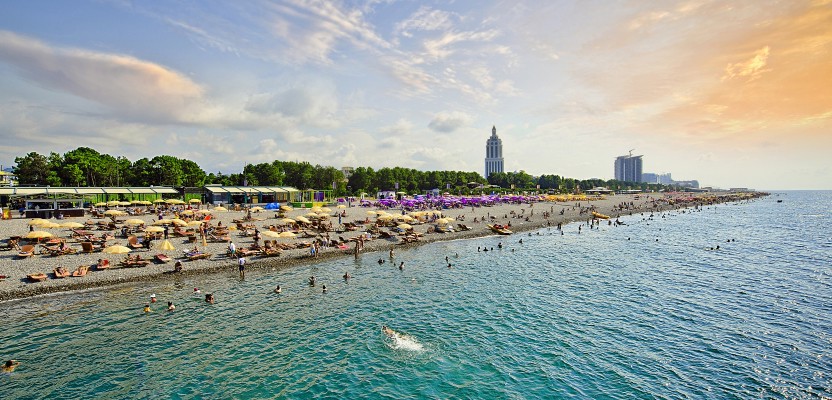
Batumi prepares to welcome tourists from July 1, reaping the rewards of Georgia’s Covid-19 strategy
Georgia’s coastal city of Batumi is set to be one of the first destinations in the world to reopen to international tourists. Following the recommendations of the World Health Organisation (WHO) and World Tourism Organisation (WTO), the Georgian government, as well as local authorities throughout the country, are actively working to create safe corridors in order to prevent the further spread of the virus, and plan on welcoming international visitors from July 1.
As part of its plan to manage the pandemic, the Georgian government has launched an anti-crisis plan to aid the country’s economically important tourism sector. The comprehensive plan involves both deferring and suspending taxes as well as financial assistance and subsidising bank loans. A number of hotels throughout the country were turned into quarantine zones, as Georgian citizens, returning home from various virus-struck countries, were accommodated for 14 days in mandatory quarantine.
The measures taken to prevent the spread of Covid-19 in Georgia have been extremely effective. The country has the lowest rate of deaths per capita of anywhere in emerging Europe, and a total of just 671 people have been confirmed as having the new coronavirus. There are currently just 266 active cases in the country.
On May 15, Georgian Prime Minister Giorgi Gakharia said that there were no plans to extend the current state of emergency, which expires on May 22, and that the curfew which restricts movement outside of the home between the hours of 9pm and 6am will be lifted.
This has made it possible for Georgia to green light the resumption of domestic tourism from June 15 and to open its borders for international travellers from July 1. Georgia is about to create a number of Green Zones, beginning with Batumi and the Ajara region, where the chairman of the regional government, Tornike Rijvadze, has done much to ensure that tourism can restart, noted this week that social distancing will be monitored on the beach and added that he is sure both Georgians and international tourists will take into account social distancing to be safe.
The country has even come up with a new slogan: Georgia: The Safe Destination.
“Before, the world knew us as a country for our ancient traditions of hospitality. Now the world will recognise us as a safe destination. We need to use the new competitive advantage that our country has acquired in its fight against the pandemic,” says Natia Turnava, Georgia’s economy minister.
Batumi has long been Georgia’s playground. And yet while most visitors come to enjoy the long, sub-tropical summers on the beach or to try their luck in its many upmarket casinos, there is far more to the city than sun and gambling.
Batumi’s soaring skyscrapers, clearly visible as planes approach the city, are evidence of the impressive economic growth which Georgia has experienced over the past decade. Indeed, there is more evidence of how far Georgia has come in recent times here on Black Sea than there is, certainly at first glance, in the country’s capital, Tbilisi. The short drive to the city centre from the airport (where the long queues at passport control owe less to inefficiency and more to the fact that the customs staff enjoy engaging in banter with each and every passenger) is the perfect introduction to the surreal world of Batumi.
Rustaveli Avenue, named after Georgia’s best-known poet, follows the shore of the Black Sea and many of the buildings which have shot up over the past few years, not least the many five-star hotels, are opulent and palatial.
Georgia is quite rightly proud of its beautiful alphabet, so much so that in since 2011 a 130-metre tower has dominated the seafront at Batumi as a testament to the uniqueness of the alphabet. The structure, known as the Alphabet Tower, combines the design of DNA, in its familiar double helix pattern, with two bands rising up the tower each holding the 33 letters of the modern Georgian alphabet. The letters are each four metres tall.
There’s a lift to the top if you’re after some decent views of the city and the mountains beyond, as well as a restaurant which, this being Batumi, revolves. A far more poignant structure is the moving (in every sense of the word) statue of Ali and Nino. He was Azeri, and Muslim, she was Georgian, and Christian. Nobody approved. They loved each other anyway.
But if you see one thing in Batumi, make it the botanical gardens. Set in the hills above the city they were opened in 1912 and are the largest anywhere in the world outside of the United States. They are split into 21 distinct sections and there is a choice of 12 marked routes to choose from, each taking in different parks of the park. Don’t miss the bananas, which grow here but are alas never ripe enough to eat, the enormous evergreen sequoias or the exquisite rose garden. A day here may be enough to convince you that Covid-19 never happened.
Your choice of holiday destinations this year may be limited. But Georgia, and its Black Sea gem, is very much open for business. There has probably never been a better time to visit.
—
Unlike many news and information platforms, Emerging Europe is free to read, and always will be. There is no paywall here. We are independent, not affiliated with nor representing any political party or business organisation. We want the very best for emerging Europe, nothing more, nothing less. Your support will help us continue to spread the word about this amazing region.
You can contribute here. Thank you.



